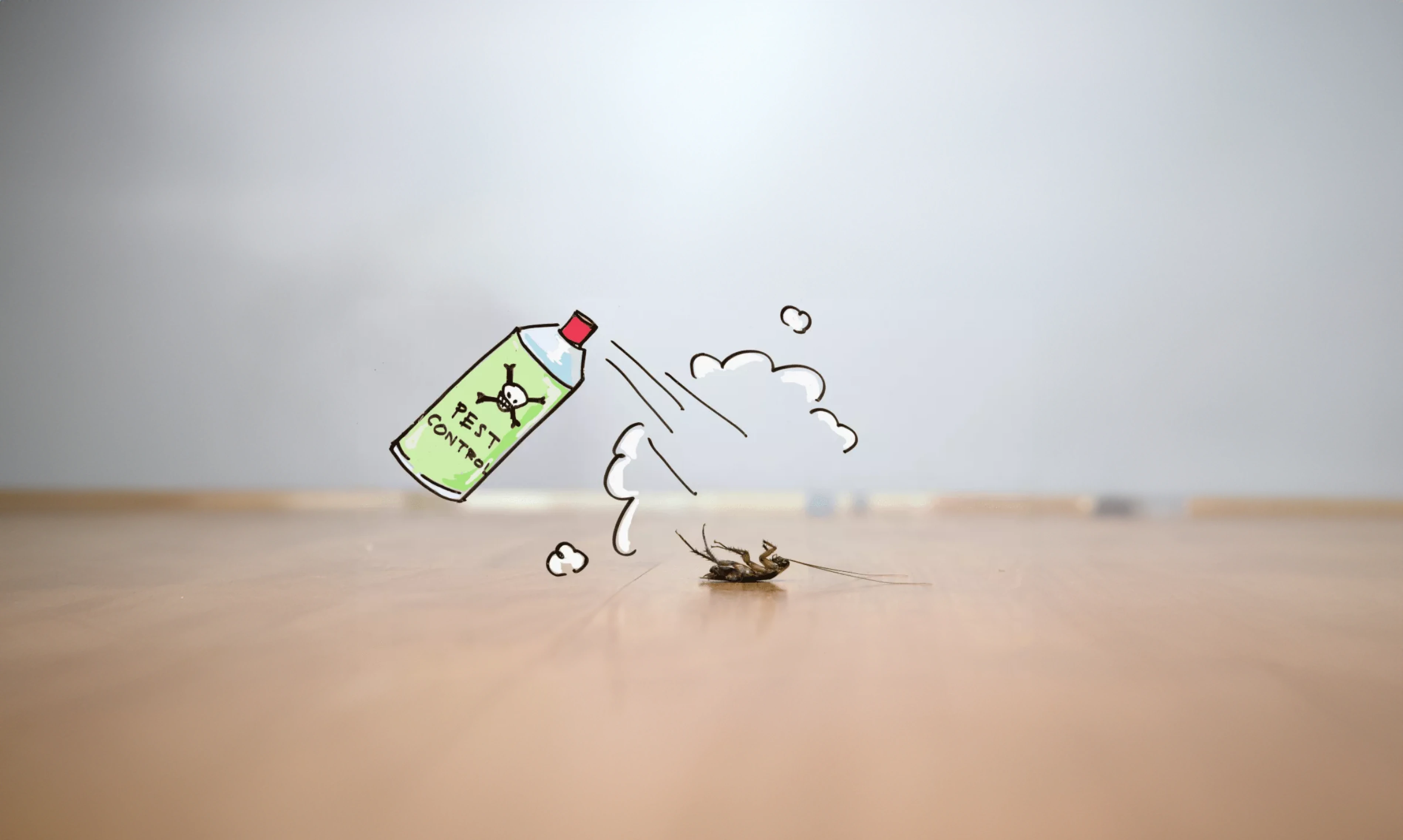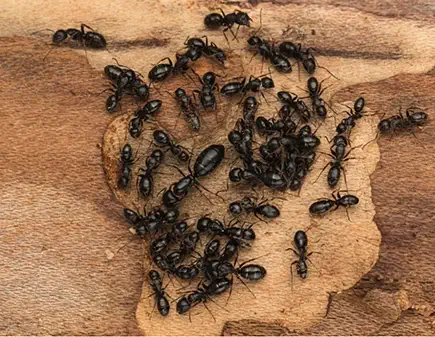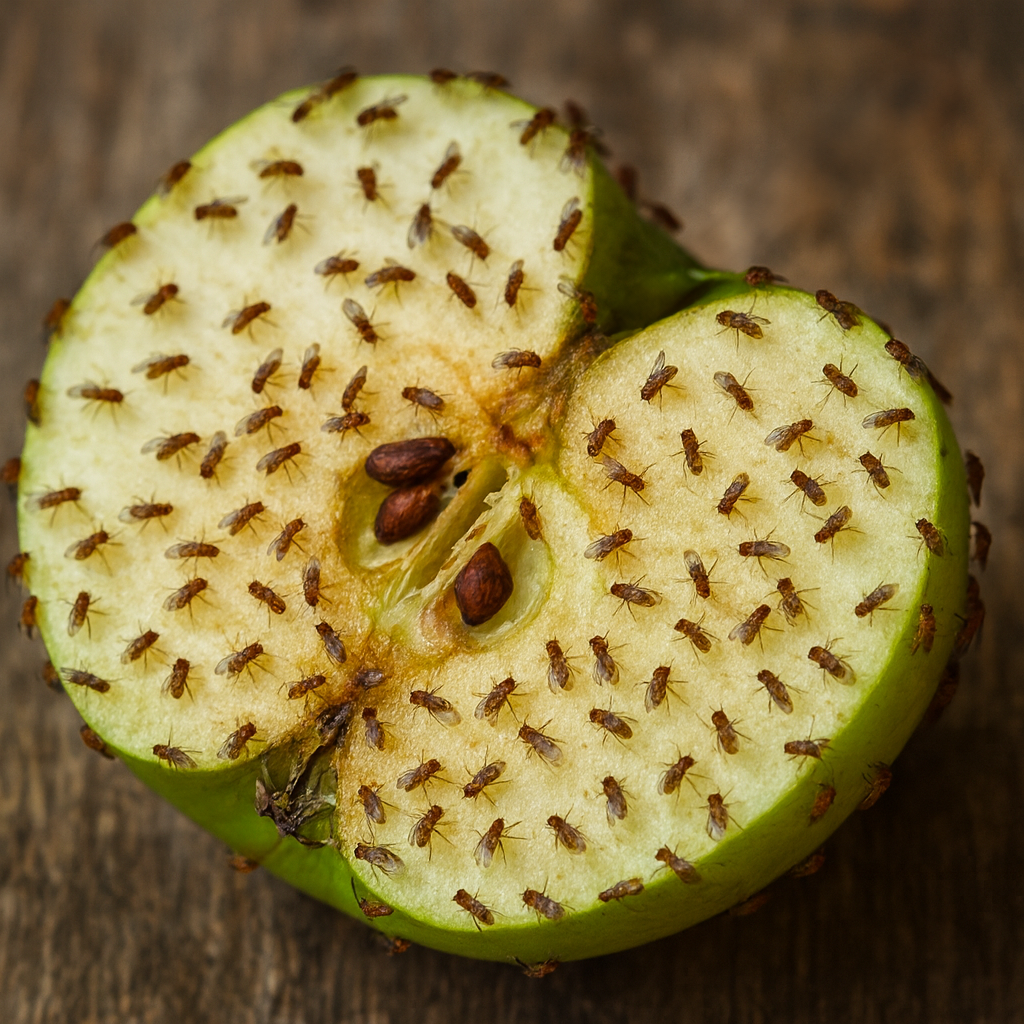
Vancouver Fruit Fly Control - Seasonal Prevention Tips
Fruit Fly Control Guide
Discovering swarms of tiny flies hovering around your kitchen can be incredibly frustrating, especially when they seem to appear overnight. Fruit flies are among the most persistent household pests, but understanding their behavior and implementing comprehensive prevention strategies can eliminate them effectively. Contact Seasonal Solutions today for a free quote and discover why thousands of Vancouver-area homeowners trust our proven fruit fly control methods.
Table of Contents
- Understanding Fruit Flies
- Control Methods
- Where Do Fruit Flies Come From?
- Prevention Strategies
- Professional vs DIY Solutions
- Seasonal Considerations
- When to Call Professionals
- Frequently Asked Questions
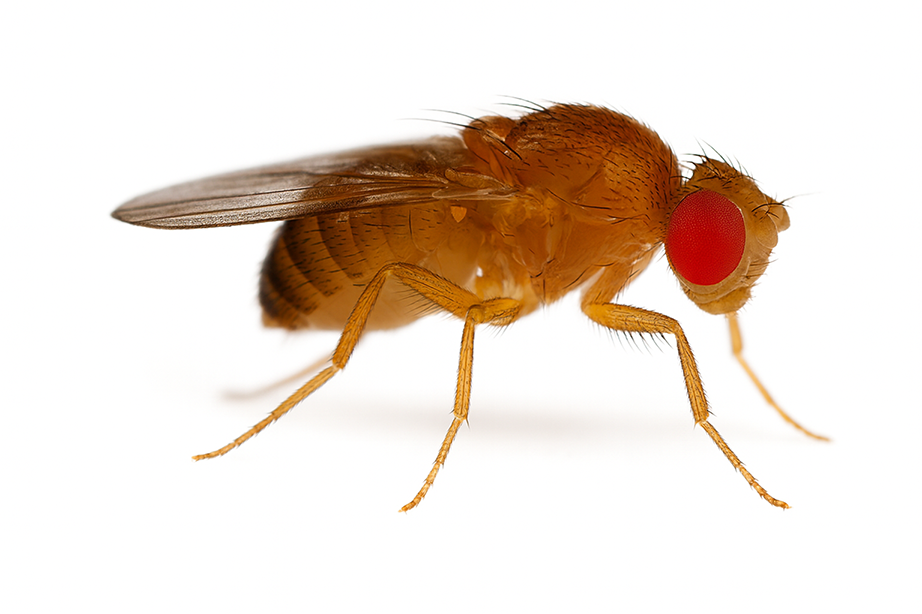
Understanding Fruit Flies
Fruit flies (Drosophila melanogaster) are small insects measuring just 3-4 millimeters in length, characterized by their distinctive red eyes and tan to light brown bodies with dark abdominal rings. These seemingly harmless pests pose significant challenges for homeowners due to their rapid reproduction cycle and ability to contaminate food preparation areas.
The lifecycle of fruit flies is remarkably swift, progressing from egg to adult in as little as seven days under optimal conditions of warmth and moisture. A single female can lay approximately 500 eggs during her lifetime, typically depositing them on the surface of fermenting organic matter where larvae will have immediate access to food sources.
Understanding fruit fly behavior is crucial for effective control. These insects are attracted to fermenting organic materials from considerable distances, drawn by the chemical compounds released during decomposition. They're most active during daylight hours and tend to congregate near breeding sites, making identification of problem areas relatively straightforward for trained professionals.
Key characteristics include:
- Small size (3-4mm) with bright red or dark eyes
- Tan to brown coloration with distinctive wing patterns
- Strong attraction to fermenting organic matter
- Rapid reproduction under favorable conditions
- Ability to squeeze through tiny openings and screens
Where Do Fruit Flies Come From?

Contrary to popular belief, fruit flies don't spontaneously generate in clean kitchens. They're attracted to specific environmental conditions and often arrive on produce purchased from grocery stores or farmers markets. Understanding their origins helps implement more effective prevention strategies.
Fruit flies typically enter homes through several pathways. They may arrive as eggs already present on fruits and vegetables purchased from stores, particularly on damaged or overripe items. Adult flies can also enter through open doors, windows, or damaged screens, drawn by the scent of fermenting organic matter from considerable distances.
Once inside, fruit flies seek out breeding sites in moist environments containing organic matter. Common breeding locations include sink drains, garbage disposals, compost containers, recycling bins with sticky residue, and even seemingly clean areas where small amounts of organic matter have accumulated.
The Pacific Northwest climate, particularly during Vancouver's warmer months, creates ideal conditions for fruit fly activity. The combination of moisture from coastal weather patterns and seasonal abundance of fresh produce makes British Columbia homes particularly susceptible to infestations during late spring through early fall.
Primary entry and breeding sources:
- Produce brought home from grocery stores or markets
- Open windows and doors during warm weather
- Sink drains and garbage disposal systems
- Compost bins and organic waste containers
- Recycling containers with food residue
- Pet food bowls and water dishes
Prevention Strategies
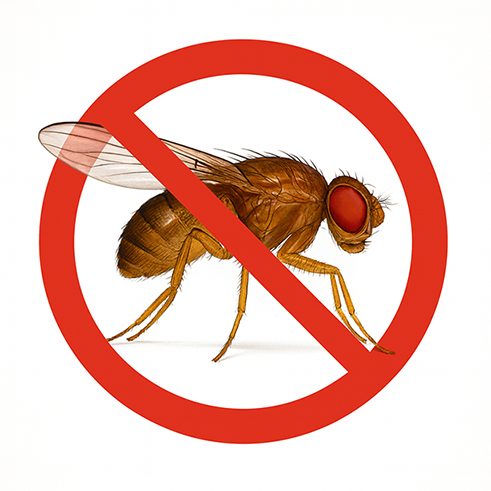
Effective fruit fly prevention requires understanding their needs and systematically eliminating conducive conditions. The most successful prevention strategies focus on eliminating breeding opportunities rather than simply reacting to existing populations.
Produce Management Protocol:
Implementing proper produce handling significantly reduces fruit fly attraction and breeding opportunities. Wash all fruits and vegetables immediately upon bringing them home to remove any existing eggs. Inspect items carefully for damage or overripeness before storage, removing any compromised pieces immediately.
Store ripe produce in refrigerators whenever possible, as cold temperatures halt fruit fly development and reduce attractive fermentation odors. For items requiring room temperature ripening, use paper bags or closed containers rather than leaving produce exposed on countertops.
Kitchen Sanitation Standards:
Maintain consistently high sanitation standards throughout food preparation and storage areas. Clean up spills immediately, particularly those involving fruit juices or other organic matter. Pay special attention to areas around garbage containers, recycling bins, and pet feeding areas where organic residue commonly accumulates.
Implement regular deep-cleaning schedules for sink drains, garbage disposals, and other moisture-prone areas. Use bacterial digesters or enzyme cleaners designed for drain maintenance to eliminate organic buildup that provides breeding sites.
Moisture Control Measures:
Fruit flies require moisture for reproduction, making humidity control an essential prevention component. Ensure proper ventilation in kitchens and food storage areas. Address any plumbing leaks promptly and maintain dry conditions around sinks and appliances.
Store cleaning equipment like mop heads and sponges in dry conditions after use. Avoid leaving wet cleaning cloths or standing water in containers where fruit flies might establish breeding sites.
Integrated Prevention System:
The experts at Seasonal Solutions Pest Services recommend combining multiple prevention strategies for optimal results. Our certified technicians can assess your specific environment and develop customized prevention programs that address the unique challenges of Vancouver's climate and seasonal pest patterns.
Control Methods
When dealing with an active fruit fly problem, immediate action focuses on reducing adult populations while simultaneously addressing breeding sources. Effective immediate control requires a multi-pronged approach combining population reduction with source elimination.
Enhanced Vinegar Trap Method:
Create highly effective traps using apple cider vinegar as the primary attractant. Fill a shallow container with two ounces of apple cider vinegar and add several drops of liquid dish soap to break surface tension. Cover the container with plastic wrap and create small entry holes using a toothpick. The vinegar attracts flies while the soap prevents escape, drowning captured insects.
Strategic Trap Placement:
Position traps near suspected breeding areas rather than randomly throughout the kitchen. Focus on areas around fruit storage, near sinks, close to waste containers, and adjacent to any moisture sources. Replace trap contents every 2-3 days or when effectiveness diminishes.
Immediate Sanitation Protocol:
Begin comprehensive cleaning of all potential breeding sites immediately upon discovering fruit flies. This includes thorough cleaning of sink drains using boiling water, removal of all overripe produce, cleaning of recyclable containers before storage, and elimination of any standing water or moisture accumulation.
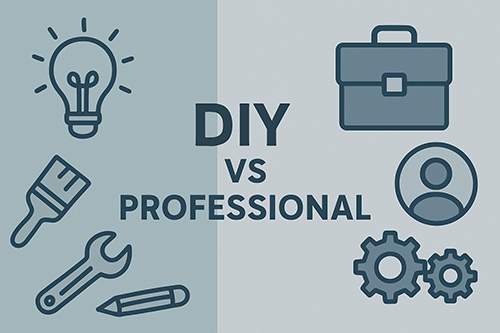
Professional vs DIY Solutions
Understanding the fundamental differences between DIY approaches and professional pest control helps homeowners make informed decisions about fruit fly management. While DIY methods can provide temporary relief for minor issues, persistent or recurring problems typically require professional expertise for effective resolution.
Limitations of DIY Approaches:
Most DIY fruit fly control methods focus on capturing adult flies without addressing breeding sources. Vinegar traps, while somewhat effective at reducing visible populations, don't eliminate larvae or prevent new generations from developing. This results in recurring problems as new adults emerge from untreated breeding sites.
DIY solutions also lack the systematic approach necessary for comprehensive control. Homeowners often miss critical breeding sites or fail to implement prevention measures consistently, allowing populations to re-establish quickly.
Professional Advantages:
Professional pest control services like Seasonal Solutions Pest Services employ systematic inspection methods to identify all breeding sources, including those commonly overlooked by property owners. Our licensed and insured technicians understand fruit fly biology and behavior, enabling targeted treatments that address root causes rather than symptoms.
Comprehensive Assessment Value:
Professional inspections often reveal breeding sources that homeowners don't recognize. These might include moisture accumulation under appliances, organic buildup in floor drains, or subtle food residue in unexpected locations. Our certified technicians have over 10 years of local experience identifying these hidden problem areas.
Long-term Effectiveness:
While DIY methods may provide temporary relief, professional treatments focus on sustainable solutions that prevent re-infestation. Seasonal Solutions Pest Services offers comprehensive pest management programs that include ongoing monitoring and prevention protocols tailored to your specific environment.
Seasonal Considerations for Vancouver
Vancouver's unique climate patterns create specific challenges and opportunities for fruit fly control throughout the year. Understanding these seasonal variations helps implement more effective prevention strategies tailored to regional conditions.
Spring and Summer Peak Activity:
The combination of increased temperatures and fresh produce availability during spring and summer months creates optimal conditions for fruit fly activity in the Lower Mainland. Warmer temperatures accelerate reproductive cycles, while increased outdoor activities and open windows provide more opportunities for flies to enter homes.
During these peak months, prevention measures become critically important. Fruit fly activity typically intensifies from May through September in the Vancouver area, coinciding with local growing seasons and increased fresh produce consumption.
Fall Transition Challenges:
As outdoor temperatures cool, fruit flies seek warm indoor environments for continued breeding. This seasonal transition often leads to increased indoor activity as populations concentrate in heated spaces. Harvest seasons also bring increased volumes of fresh produce into homes, providing abundant breeding opportunities.
Winter Indoor Risks:
While outdoor fruit fly activity decreases during Vancouver's cooler months, indoor heating systems create year-round breeding potential. Heated homes with stored produce and organic waste can maintain fruit fly populations throughout winter, making consistent prevention protocols essential regardless of season.
Seasonal Prevention Adaptations:
Effective seasonal control requires adjusting prevention strategies based on climate conditions and seasonal produce patterns. During peak seasons, increase inspection frequency for breeding sites and implement more aggressive sanitation protocols. In winter, focus on indoor moisture control and heated area management.
For year-round protection adapted to British Columbia's unique climate patterns, Seasonal Solutions Pest Services provides comprehensive pest management programs that account for local environmental factors and seasonal pest behaviors.
When to Call Professionals
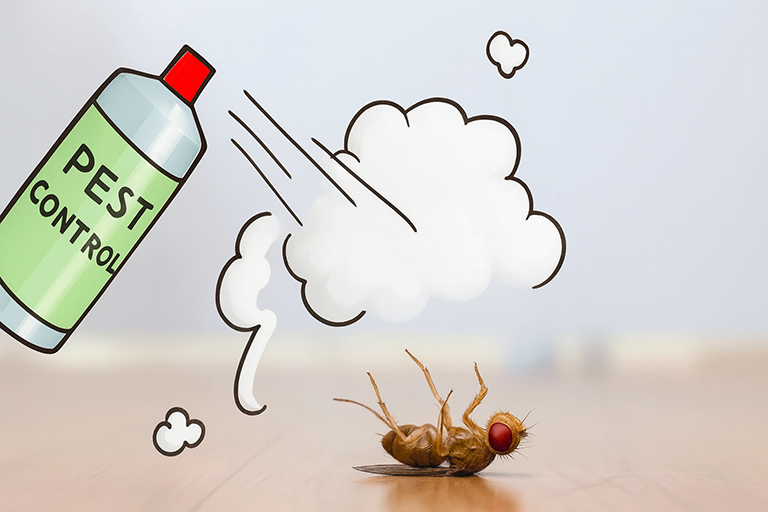
Recognizing when fruit fly problems require professional intervention can save time, money, and frustration while preventing minor issues from becoming major infestations. Certain situations indicate that DIY approaches are unlikely to provide effective, lasting solutions.
Persistent Infestations:
If fruit flies continue appearing despite eliminating obvious breeding sites and implementing basic prevention measures, professional assessment becomes necessary. Persistent problems often indicate hidden breeding sources that require professional expertise to identify and address.
The rapid reproduction cycle of fruit flies means that incomplete control efforts quickly become ineffective. Professional pest control technicians have the training and tools necessary to locate and eliminate all breeding sources, ensuring complete control rather than temporary population reduction.
Large or Recurring Populations:
When fruit fly numbers remain consistently high or populations return quickly after apparent elimination, professional intervention provides the systematic approach necessary for effective control. Large populations often indicate multiple breeding sites or environmental conditions that require professional assessment and modification.
Commercial Food Service Environments:
Restaurants, cafeterias, and other commercial food preparation facilities face unique challenges that require specialized knowledge and treatment approaches. Professional pest control ensures compliance with health regulations while protecting business reputation and customer safety.
Health and Safety Concerns:
Fruit flies can contaminate food preparation surfaces and potentially transmit bacteria between breeding sites and food storage areas. When food safety is a concern, particularly in homes with vulnerable individuals or commercial food operations, professional control provides the comprehensive approach necessary to eliminate health risks.
Time and Cost Efficiency:
Professional treatment often proves more cost-effective than repeated DIY attempts, particularly when considering the time investment and ongoing material costs of ineffective approaches. Seasonal Solutions Pest Services provides rapid response times and proven methods that eliminate problems efficiently.
Professional Assessment Benefits:
Our certified technicians can identify environmental factors contributing to fruit fly problems and recommend modifications and professional advice that provide long-term prevention. This comprehensive approach addresses not only immediate populations but also underlying conditions that allow infestations to develop.
Professional intervention indicators:
- Persistent activity despite elimination efforts
- Large or rapidly returning populations
- Commercial food service environments
- Health and safety concerns
- Multiple failed DIY attempts
- Need for comprehensive prevention programs

Frequently Asked Questions
What's the difference between fruit flies and drain flies?
Fruit flies and drain flies are commonly confused but require different control approaches. Fruit flies are smaller (3-4mm) with red eyes and tan bodies, active during daylight hours around produce and organic matter. Drain flies are slightly larger with fuzzy, moth-like appearance and primarily active at night around moisture sources like drains and sewers.
How long does it take to eliminate a fruit fly infestation?
The timeframe for elimination depends on the extent of the infestation and thoroughness of control measures. With professional treatment that addresses all breeding sources, most residential infestations can be controlled within 1-2 weeks. However, DIY approaches often require several weeks or months because they typically fail to eliminate all breeding sites.
Can fruit flies survive in refrigerated environments?
Cold temperatures halt fruit fly development and can kill adults, making refrigeration an effective prevention strategy. However, fruit flies can survive brief periods of cold exposure, and eggs or larvae present on produce can become active when items return to room temperature.
Are there natural repellents that deter fruit flies?
While some essential oils like basil, peppermint, and lemongrass may have mild deterrent effects, they're not reliable for serious infestations. Professional-grade prevention focuses on eliminating attractants and breeding sites rather than relying on repellents, which typically provide minimal effectiveness against determined fruit fly populations.
Why do fruit flies seem to appear suddenly?
Fruit flies don't appear spontaneously but develop rapidly from eggs already present in your environment. Their 7-10 day development cycle means that small, unnoticed breeding sites can quickly produce large, visible populations that seem to appear overnight.
Can fruit flies develop resistance to control methods?
Fruit flies don't typically develop resistance to properly implemented control methods because effective professional treatment focuses on source elimination rather than repeated exposure to the same chemical treatments. However, incomplete control efforts can allow resistant individuals to establish new populations.
Final thoughts
Effective fruit fly control requires understanding their biology, implementing comprehensive prevention strategies, and recognizing when professional intervention provides the most efficient solution. While DIY methods can help with minor issues, persistent or recurring fruit fly problems benefit from the systematic approach that professional pest control services provide.
The key to long-term success lies in addressing root causes rather than treating symptoms. This means eliminating breeding sites, modifying environmental conditions, and implementing prevention protocols that account for seasonal variations and regional climate factors specific to Vancouver.
Seasonal Solutions Pest Services brings over 10 years of local experience to fruit fly control, combining scientific understanding with practical solutions tailored to Vancouver-area homes and businesses. Our licensed and insured technicians provide comprehensive assessments, targeted treatments, and ongoing prevention programs that deliver lasting results.
Don't let fruit flies compromise your home's comfort and food safety. Contact Seasonal Solutions today for a free quote and discover why thousands of customers trust our proven approach to pest control. Our certified technicians provide rapid response times for urgent situations.
Your satisfaction is our priority, and our comprehensive pest management programs ensure that fruit fly problems don't return. Let our expertise and local knowledge provide the peace of mind that comes with effective, professional pest control solutions.


